BenQ CP120 Wireless Projector Review
BenQ CP120 Wireless Projector
Jonathan Bray looks at BenQ's diminutive CP120 projector to find out if its built-in Wi-Fi is more than just a gimmick.
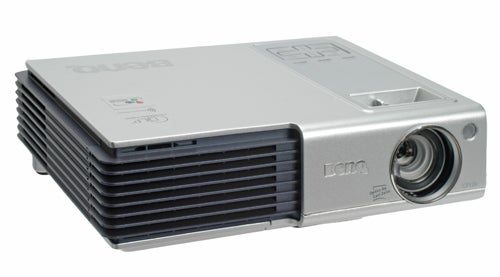
Verdict
Key Specifications
- Review Price: £1048.00
It’s all going wireless for the businessman on the move. First Bluetooth came along and freed him from his strangulating wired hands-free kit. Then Wi-Fi and 3G let him browse the Internet on the move. Now it seems that other peripherals are following suit. Music players, keyboards, Internet radios – everything’s jumping on the wireless bandwagon. And that, it would seem, includes the humble portable projector.
BenQ’s CP120 is one of a growing number of presentation devices that are throwing off the shackles of the bulky VGA cable. InFocus’s diminutive LP120 was one of the first projectors we looked at that had a wireless option and there are plenty of others from the likes of Panasonic, Sony and Epson that boast the feature too.
With the CP120 the wireless adaptor is built in rather than available via a separate module, which makes it a much more elegant solution than the LP120’s. Essentially, however, the same effect is achieved – and with exactly the same limitations.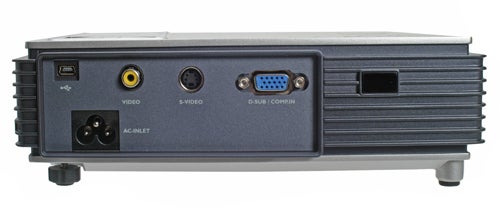
To enable it all you do is install BenQ’s Wireless Wizard software on your laptop and run it when you want to send a picture to the projector. Response times can be little sluggish (the mouse doesn’t move that smoothly, for example), but by and large it works fine. Bear in mind, though, that the wireless adaptor built into the CP120 is only capable of receiving data at a rate of up to 54Mb/s (it’s compatible with a, b and g networks. That means it’s fine as long as you stick to basic PowerPoint presentations and Windows displays, but it doesn’t like video and moving pictures – there’s just not the bandwidth available.
It’s not the nice-to-have wireless capability, however, that’s the CP120’s strongest suit. It’s in other, more important, areas that it starts racking up serious Brownie points. First it’s small – very, very small. BenQ, in fact, claims it’s the smallest wireless projector you can buy. I don’t know how true that is (the Infocus LP120 is smaller, even with its wireless dongle plugged in) but it certainly is about as small as you’d want a projector to be at about the size of a small box of chocolates and not much heavier (1.3Kg).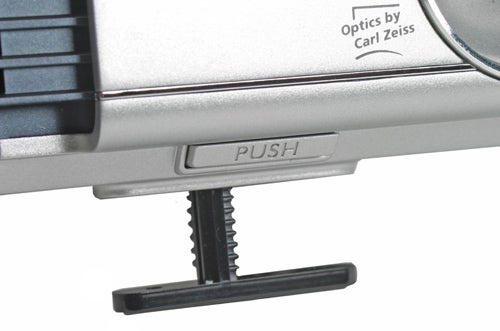
It is also well-built and thoughtfully designed. The tilt leg at the front, for instance, is much more sturdy than the flimsy affair you usually get on other projectors. It slides out slowly and smoothly, too, like the drawers in an expensive kitchen. And there’s an integrated lens cap that slides neatly back into place when you’ve finished your presentation.
Continuing the practical theme, if you delve into the menu system you’ll find there’s ‘real-time’ automatic keystone adjustment on offer. Adjust the projector up and down and it senses the angle, changing the keystone compensation automatically. It’s very clever and useful too when you’re desperately trying to look professional in front of that all-important client.
On top of all that, the CP120 boasts a feature called quick cool. This lets you to switch it off, unplug it and pack it away at the end of your presentation all in around thirty seconds. This might not sound like much but most compact projectors need at least a two or three minute cool down period, during which you can’t disconnect from the mains without doing damage to the bulb. If your small-talk skills aren’t up to scratch it could help you to avoid a few uncomfortable silences at the end of meetings. In fact one of the only impractical features of the CP120 is the control panel. Though it looks rather fetching with its blue backlit buttons, they’re fiddly and set far too close together.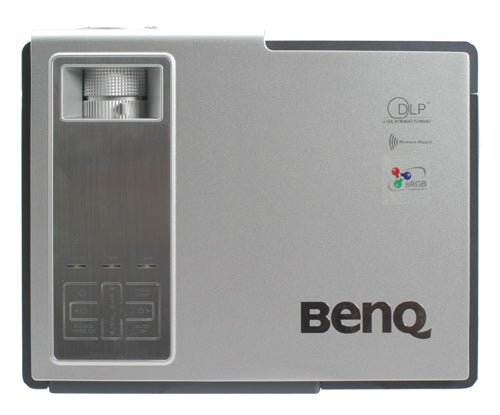
Under the hood it’s pretty much what you’d expect from a modern portable projector. Picture is generation is driven by Texas Instruments’ ubiquitous DLP technology and a 132W user-replaceable lamp. What you get from this a native resolution of 1,024 x 768 and an impressive brightness rating of 1,500 ANSI lumens – 500 up on the Infocus LP120 and on a par with Dell’s impressive 3400MP. Contrast is rated at 2000:1 – again an impressive figure – and all of this is coupled with optics from famed lens manufacturer, Carl Zeiss.
The result is a quality picture but not an exceptional one. Whether you connect a laptop to the CP120 via the D-sub input or a video source via the S-Video connection (component video connection is also available with a special VGA cable) the projected image is both consistently bright, and well-focussed across the screen. The contrast didn’t seem quite as good as that produced by the Dell 3400MP however. Colours looked dull and a little washed out in comparison and video wasn’t as crisp either, which is probably down to the CP120’s lack of advanced de-interlacing and motion compensation image processing.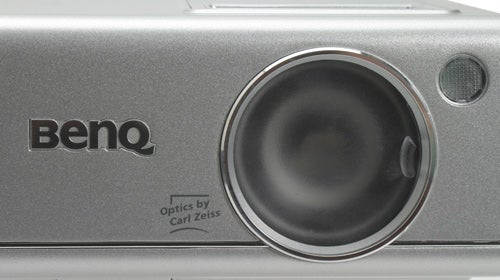
That said you could quite happily use this projector as a presentation workhorse during the day and a movie projector during the evening. Overall it’s still a better performer than the InFocus LP120, and the five-segment colour wheel keeps the rainbow effect at bay remarkably effectively too.
”’Verdict”’
I am yet to be convinced that wireless projection is anything more than a tickbox feature. It seems a lot of hassle just for the sake of not carrying a VGA cable around, but at least the BenQ doesn’t charge a King’s ransom for the privilege – £1,048 is about average for a portable projector of this specification.
In other areas, however, the CP120 is a very clever piece of kit. It can’t quite match the best portable projector around in terms of picture quality (Dell’s 3400MP). It’s not as portable as the InFocus LP120. But it has been designed with business travellers in mind and those thoughtful touches – such as the real-time automatic keystone adjustment and quick cooling – may well be enough to persuade them to opt for a CP120 instead.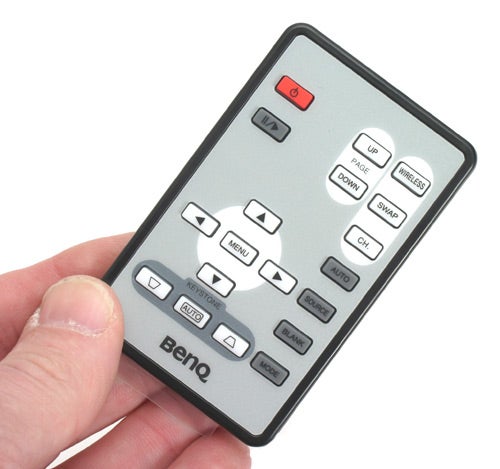
(table:table)
Trusted Score
Score in detail
-
Image Quality 7
-
Value 8

